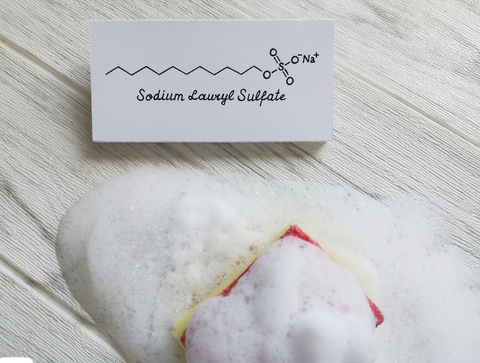
Our hair is an integral part of our own identity and part of how we present ourselves to the world. We take great care to style it, keep it tidy, trimmed, dye it, and keep it healthy, not forgetting the part that includes choosing the right hair care products.
Sodium Lauryl Sulfate (SLS) is a surfactant, which is a substance that helps break down dirt, grease, and grime. It's found in thousands of household cleaning products, as well as personal care items like shampoo, toothpaste, and soap. But lately, SLS has gotten a bad rap due to its potential health effects.
One of the main concerns about SLS is that it's a known skin irritant. This means that it can cause dryness, redness, and itching in some people. It can also strip away the natural oils that protect your hair and skin, leaving it vulnerable to irritation. In addition, SLS has been shown to cause eye irritation and inflammation. And if you're using products that contain SLS on a daily basis, these effects can add up over time.
Another concern about SLS is that it's often contaminated with 1,4-dioxane, a known carcinogen. This contaminant can enter your body through your skin when you use products that contain SLS. And once it's in your body, 1,4-dioxane can stay there for years. Studies have shown that long-term exposure to 1,4-dioxane can increase your risk for cancer.

So should you avoid all products that contain SLS? Not necessarily. While there are some risks associated with using products that contain SLS, the overall risk is relatively low. And in many cases, the benefits of using these products outweigh the risks. For example, SLS is an effective cleansing agent that helps remove dirt, oil, and makeup from your skin. It's also been shown to help reduce plaque build-up on teeth.
However, there are some key reasons you may want to think about avoiding it in the future:
SLS is a skin irritant.
SLS has been linked to skin irritation, dryness, and itching. If you have sensitive skin or skin conditions like eczema or psoriasis, avoiding SLS can help prevent flare-ups and even help alleviate existing conditions.
SLS is a harsh cleanser. While SLS is a good surfactant, it can be too harsh for some hair types. It’s especially important to avoid SLS if you have dry or damaged hair, as it can strip away the natural oils that keep your hair healthy.
SLS can be damaging to colour-treated hair. If you colour your hair, it’s important to use products that won’t strip away the colour. SLS often does just that, leaving your hair dull and discoloured. SLS can accumulate over time. When SLS accumulates on the scalp, it can build up and cause a number of problems, from dandruff to an itchy and flaky scalp.

Fortunately, there are plenty of effective alternatives to SLS. Natural ingredients, like aloe vera, pomegranite, coconut oil, and jojoba oil, can help keep your hair healthy and strong. These natural ingredients can help to seriously nourish and protect your hair. Aloe vera is a natural moisturiser that helps keep your hair hydrated, while coconut oil is a great source of fatty acids to help strengthen your hair. Jojoba oil is fantastic for conditioning, as it helps keep your scalp moisturised without leaving behind any residue.
In addition to natural ingredients, there are also a variety of products available that are specifically designed to be sulfate-free. These products are formulated to provide the same cleansing and conditioning benefits as SLS-containing products but without harshness. When it comes to hair care, it’s important to be mindful of the products you’re using. While SLS can be effective for some, sometimes it’s not for everyone. By opting for alternatives to SLS, you can keep your hair healthy, strong, and looking its best.


